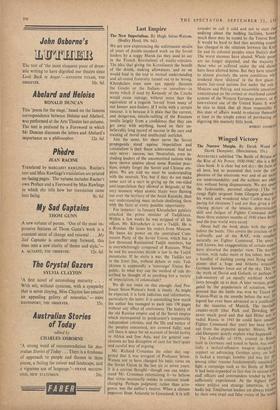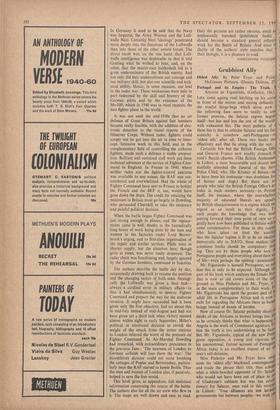Winged Victory
ACCURATELY subtitled The Battle of Britain at the Rise of Air Power, 1930-1940,' this is a first' class book. It is clear but not dry: the facts at` all here, but so presented that even the Copt plexities of the electronic war and of air tactiti are understandable; and the authors are oblf4 tive without being dispassionate. We are spar the fashionable, personal claptrap ('The to rangy flight sergeant from Glasgow glanced his watch and wondered what Cookie was 1)1r paring for elevenses.') and are thus given a COIr vincing picture of the tension, determinati° skill and fatigue of Fighter Command durid, those three summer months of 1940 when Briton and the free world were saved. About half the book deals with the WI..Ad before the battle. This covers the creation of Ib,f Luftwaffe and of the RAF, with empbasi: naturally on Fighter Command. The storY well known, but exaggerations of certain asPecte have distorted the popular view. The wartitli version, with radar more or less taboo, was 01, a handful of dashing young men flying suPtI,e planes shot a huge and hitherto irresistilYi German bomber force out of the sky. This rva the myth of David and Goliath, or perhaps III, folk-memory of an equally mythical Arrna' story brought up to date. A later version, proPt'd gated by the popularisers of scientism, would pretend that the battle was won by Wizard an Watson-Watt in the months before the war; I11,, legend has even been advanced as a justificatia'. for the inanities of Munich. The inevitabl: counter-myth (that Park and Dowding Were never much good and that had Hitler not II1A. vaded Russia in 1941 he could have mastic; Fighter Command that year) has been trottet out from the expected quarter. Messrs. WOO and Dempster quietly explain what happened. The Luftwaffe of 1939, created in Russia built in Germany and tested in Spain, was esscIti tially a tactical-offensive weapon designed I, support an advancing German army on tan,' It lacked a strategic bomber and was for fb15„ among other reasons fundamentally unstilted I" fight a campaign such as the Battle of Britabli It had been expanded so fast that its second-10c staff officers and commanders tended tq be 1/1. sufficiently experienced. At the highest level; where politics and strategy intertwine, it 0A badly led. Totalitarian leaders are always blinde; by their own cruel and false vision of the world'
In Germany it used to be said that the Navy was Imperial, the Army Weimar and the Luft- waffe Nazi. Certainly Nazi 'ideology' penetrated more deeply into the functions of the Luftwaffe than into those of the other armed forces. The direct result was, on the one hand, that Luft- waffe intelligence was deplorable in that it told Goering what he wished to hear, and, on the other, that the master-race balderdash led to a gross underestimate of the British enemy. And not only did they underestimate our courage and our military skill, but also our scientific and tech- nical ability. Hence, in some measure, our lead in the radar war. These weaknesses were only in part redeemed by the skill and bravery of the German pilots and by the existence of the Me-109, which in 1940 was in most respects the best fighter plane in the world.
It was not until the mid-1930s that an air defence of Great Britain against fast bombers became really feasible, with the addition of elec- tronic detection to the visual reports of the Observer Corps. Without radar, fighters could simply not be got into the air in time to inter- cept. Intensive work in this field, and in the complementary field of controlling the airborne fighters, made such a defence a viable proposi- tion. Brilliant and sustained staff work put these technical advances at the service of Fighter Com- mand in England. In France in 1940, where neither radar nor the fighter-control aparatus was available to any extent, the RAF was out- numbered and overwhelmed. Had the whole of Fighter Command been sent to France to bolster the French and the BEF it, too, would have gone down the drain. The credit for retaining the minimum in Britain must go largely to Dowding, who persuaded Churchill to take the necessary and painful political decision.
When the battle began Fighter Command was just strong enough in planes, and the replace- ments came in well, thanks to the fantastically long hours of work being done by the men and women in the factories under Lord Beaver- brook's urging, and to first-class organisation of the repair and similar services. Pilots were in shorter supply, but the situation here, though grim at times, was never really desperate. The radar chain was functioning and, largely ignored by the German bombers, continued to function.
The authors describe the battle day by day, occasionally drawing back to resume the position and the changing tactics of both sides. Strategi- cally the Luftwaffe was given a dual task— always a cardinal error in military affairs—in that it had simultaneously to destroy Fighter Command and prepare the way for the seaborne invasion. It might have succeeded had it been given only the first objective, had set about this in mid-July instead of mid-August and had not been given yet a third task when victory seemed almost within sight in early September. Hitler's political or emotional decision to switch the weight of the attack from the sector stations to London relieved the worst of the pressure on' Fighter Command. As Air-Marshal Dowding had remarked, with extraordinary prescience in the previous June: 'The nearness of London to German airfields will lose them the war.' The bloodthirsty dictator could not resist bombing the cottages of Poplar and Bermondsey, particu- larly once the RAF started to bomb Berlin. Thus the men and women of London also, if passively, helped to save the free world.
This book gives, as appendices, full statistical information concerning the course of the battle. The authors also list all the air crew who flew in it. The maps are well drawn and easy to read. Only the pictures are rather obvious, small a unpleasantly bunched (publishers' fault). should become a standard general referen, work for the Battle of Britain. And since t clarity of the authors' style matches that their thought, it is a pleasure to read.
CONSTANTINE 1711 WII313











































 Previous page
Previous page